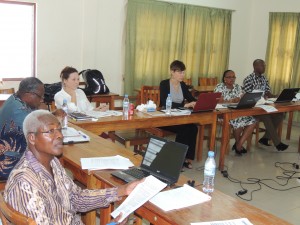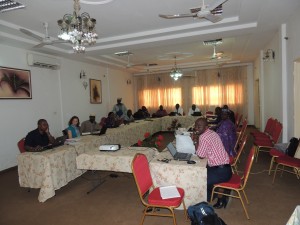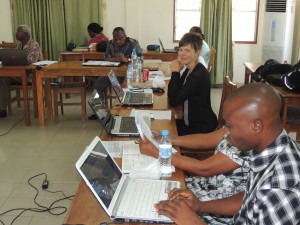Behind the scenes at the FY2014 END in Africa work planning sessions
June 19th, 2013
Alexander Graham Bell once said, “Before anything else, preparation is the key to success.” While the famous telephone inventor was more familiar with communications than global health, he may as well have been speaking directly to a group of national NTD program managers and NTD stakeholders in the affected countries.
Successful implementation of the many activities required to effectively eliminate five different NTDs in five different countries–which is the ultimate goal of the END in Africa project–requires government agencies to partner with multiple international and local organizations and donors. Together, they must work to coordinate drug administration events that will reach hundreds of millions of individuals; this requires managing the work of tens of thousands of health workers and volunteers in thousands of villages.
So, it’s not surprising that preparation and coordination are absolutely crucial to the success of the END in Africa program–especially since the stakes couldn’t be higher. Failure to reach even a few vulnerable individuals in each village with the drugs may mean the difference between NTD elimination and continued transmission of those horrible diseases in that community.
That’s why each year in every END in Africa country, the Ministry of Health (MOH) and the project sub grantee organize work planning sessions to discuss NTD plans and budgets for the following year with project partners and donors. These work planning sessions bring representatives together from USAID (the END in Africa project donor), the national NTD programs, FHI360 (the project administrator and primary partner) and the sub grantees for the respective countries, including Helen Keller International (HKI) for Burkina Faso, Niger and Sierra Leone; Health & Development International (HDI) for Togo; and Catholic Relief Services (CRS) for Ghana.
A work planning primer
The NTD stakeholders participate in these sessions to support the MOHs in revising and finalizing their work plans for the following year before they are submitted for approval to USAID. This year, a USAID representative participated in the sessions in Ghana, Togo, and Burkina Faso. In addition, FHI360 representatives including END in Africa Project Director Bolivar Pou and two additional staff members participated in the sessions in all 5 END in Africa countries. The sub grantees were also represented by local staff and employees from their respective headquarters.
In 2013, END in Africa participated in the following MOH-led NTD control work planning sessions:
– Accra, Ghana: May 6-9, 2013;
– Freetown, Sierra Leone: May 13–16, 2013;
– Lome, Togo: May 20–2, 2013;
– Ouagadougou, Burkina Faso: May 27-31, 2013;
– Niamey, Niger: June 3–6, 2013.
During each work planning session, the respective MOH and sub grantee jointly present a draft work plan for the coming fiscal year. Session participants review and revise the draft; advise on the design, development, implementation and evaluation of country- and context-specific NTD projects; provide technical assistance and support to enhance NTD program integration; and ensure that planned program activities adhere to appropriate global guidelines and policies and are technically sound.
Other than in Niger, the work planning sessions followed a similar format in all the END in Africa countries:
- Days 1 and 2 were allocated to presentations on various aspects of the NTD programs, such as MDA planning, monitoring and evaluation activities and financial issues. Following these presentations, national NTD program coordinators and a small group of representatives from USAID, FHI360, and the local and headquarters offices of the respective sub grantee in each country worked together to revise the initial draft of the NTD program work plan for that country, taking into account the information presented during these first two days.
- On day 3, session organizers presented the revised draft to a larger group that included MOH officials at the district, regional and headquarters levels, as well as representatives of non-governmental development organizations (NGDOs) involved in other NTD control efforts in the END in Africa countries. Discussions about potential areas for collaboration and challenges followed the presentation of the revised draft work plan.
- Day 4 was devoted to clarifying, summarizing and discussing the salient points that arose during the 3 days of discussion, as well as arriving at decisions on the best way to move forward on each.
Work planning in Niger
Of the working planning sessions in the five END in Africa countries, only the session in Niger deviated from the above-described format and required a modified approach, mainly due to unique concerns relating to NTD program coordination and implementation in that country. Consequently, additional discussion items were included in that country’s work planning session to address the following topics: improving NTD program coordination both within the MOH and with HKI, the sub grantee in Niger; the need to treat refugees from Mali who have been coming into the country; the need to provide additional security for NTD control teams in the field to ensure their safety in the midst of the country’s current relatively instable political climate; improving drug management to eliminate current inefficiencies; the implications arising from delays in previous MDA activities and in the internal approval process for fixed obligation grants (FOGs) in the MOH; reducing the problem of expiring medicines, MDA reporting challenges and collaboration with schools in this area; and closing the gap between the country’s census data and its forecasts regarding its MDA requirements.
Conclusions from the Niger work planning session included a recommendation that HKI increase its efforts to advocate for strengthening the country’s NTD coordination body. In addition, the participants agreed on the need to provide technical assistance to improve NTD drug management as well as to strengthen collaboration among the partners to improve MDA forecasts for Niger, implement the FIFO (first in, first out) drug inventory control practices to reduce losses from expired medications, and treat newly arriving refugees. The participants also recognized the need to modify the budget to account for the costs of providing additional security for NTD control staff in the field.
The delays that arose during previous MDAs will be addressed by implementing MDAs in the month of October (which corresponds to FY 2014), beginning this calendar year. As such, MDA data from Niger will not be reported in the FY2013 END in Africa Annual Report.
The participants also recommended that HKI, the MOH and the Ministry of Education work together to formulate a clear strategy to collaborate with the country’s schools on MDA data reporting. Finally, they recommended that HKI and the national NTD Control Program work with Niger’s National Institute of Statistics to accurately assess the target populations for MDAs.
Next steps
Following the close of each work planning session, the MOH and sub grantees further revise the country’s work plan to reflect the meeting discussions and the decisions that were made during the sessions. Then within two weeks’ time, they must submit the newly revised document to FHI360 and USAID for review and feedback. Once any additional comments and issues raised by USAID and FHI360 are addressed, the work plans are submitted to USAID for final approval. Approval of each country’s work plan marks the end of the planning process, as the MOH and END in Africa partners shift gears and begin implementing the program’s many planned activities for the new fiscal year, ultimately taking each country even closer to eliminating NTDs and the suffering they cause so many citizens.




